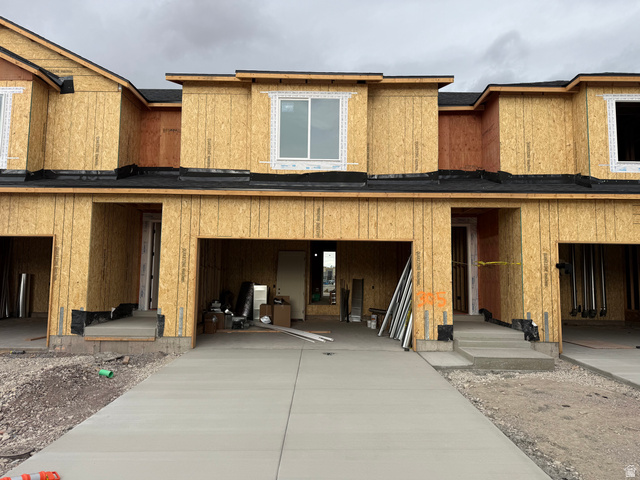
Embarking on the journey to homeownership can be daunting, especially for first-time buyers. This comprehensive guide will walk you through every essential step of the home-buying process in Utah, from selecting a reliable realtor to understanding the financial aspects involved. Whether you're ready to dive into the housing market or simply curious, this guide aims to equip you with all the information you need to make informed decisions.
Understanding the Home Buying Process
The home buying process is a complex journey that involves both practical and financial considerations. It's crucial to approach it with a clear understanding of what you're looking for in a home and how much you can afford. Let's explore these two aspects in more detail.
The Two Aspects of Home Buying
When buying a home, it's essential to consider both the physical and financial aspects. The physical aspect includes the features of the home itself, such as its size, layout, and location. Do you need a certain number of bedrooms? Is a backyard important to you? These are the types of questions you should be asking when evaluating potential homes.
On the financial side, you need to understand the costs involved beyond the purchase price. This includes fees, interest rates, and monthly payments. Knowing these details can help you determine what you can afford and prevent any surprises at the closing table.
Step 1: Hiring a Realtor
Hiring a realtor is the first step in the home buying process. A good realtor will guide you through the journey, providing valuable insights and advice. It's crucial to choose someone who communicates well and has your best interests at heart. Their experience and knowledge can save you time and money.
When you hire a realtor, you'll sign a buyer broker agreement. This document formalizes your relationship and outlines the responsibilities of each party. It ensures that your agent is committed to helping you find the right home and protects their interests as well.
Step 2: Getting Pre-Approved for a Loan
After hiring a realtor, the next step is to get pre-approved for a loan. This involves working with a lender to determine how much money you can borrow. Pre-approval gives you a clear idea of your budget and shows sellers that you're a serious buyer.
Choose a lender who understands your local market and can offer competitive rates. Local lenders often have access to special loan programs and grants that can benefit you. The Consumer Financial Protection Bureau offers helpful resources for understanding the mortgage process. Remember, it's okay to shop around and compare offers from different lenders to find the best fit for your needs.
Choosing the Right Lender
- Local Expertise: Opt for a lender with knowledge of your area's market and available loan programs.
- Reputation: Look for a lender with positive reviews and recommendations from trusted sources.
- Transparency: Ensure the lender clearly explains fees, rates, and loan terms.
Understanding Interest Rates and Buy Downs
Interest rates play a significant role in determining your monthly mortgage payment. Rates can fluctuate, so it's important to lock in a rate once you're under contract. Discuss with your lender the best time to lock in your rate.
You may also consider an interest rate buy down. This involves paying an upfront fee to lower your interest rate, either temporarily or permanently. A popular option is the 2-1 buy down, which reduces your rate by 2% in the first year and 1% in the second year.
Creating a Wish List for Your Home
Before diving into home tours, it's essential to create a clear wish list distinguishing between your needs and wants. Needs are non-negotiable features such as the number of bedrooms or accessibility requirements. These ensure the home fits your lifestyle and future plans. Wants, on the other hand, are desirable but not essential and could include features like a swimming pool or specific interior finishes.
Sharing this list with your realtor allows them to tailor their search, focusing on properties that meet your criteria. This helps streamline the process, saving time and effort by avoiding homes that don't suit your essential requirements.
Step 3: Shopping for Homes Effectively
With your wish list in hand, it's time to start the home search. Instead of touring a large number of properties, focus on a select few that genuinely meet your criteria. Utilize online listings, photos, and maps to narrow down your options. Aim to visit three to five top choices initially, allowing for a more focused and productive viewing experience.
During these tours, take note of any potential issues or features that stand out. This will aid in making a more informed decision when it comes time to submit an offer. Remember, your realtor is a valuable resource and can gather additional information about a property to address any questions or concerns you may have.
Taking Notes During Home Tours
- Pros and Cons: Jot down what you like and dislike about each property to help with comparisons later.
- Condition of Major Systems: Pay attention to the age and state of essential systems like the HVAC, plumbing, and roofing.
- Overall Impression: Note your emotional response to each home, as this can be a significant factor in your decision.
Don't hesitate to revisit a home if needed. Bringing along family or friends can provide additional perspectives and insights, helping you to feel more confident in your decision.
Step 4: Submitting an Offer
Once you've found a home that meets your criteria, it's time to prepare and submit an offer. Work closely with your realtor to craft a competitive offer that aligns with both your needs and the seller's expectations. Key components of an offer include the purchase price, earnest money deposit, and any contingencies or requests for the seller.
Consider including terms that make your offer more attractive, such as a quicker closing timeline or a willingness to cover certain closing costs. Your realtor will help you navigate these options to create an offer that stands out in a competitive market.
Explore Utah Real Estate

83 W 850 S, Centerville, UT
$815,000
Bedrooms: 5 Bathrooms: 3 Square feet: 3,999 sqft

653 E RYEGRASS DR #305, Eagle Mountain, UT
$387,900
Bedrooms: 3 Bathrooms: 3 Square feet: 1,985 sqft

2098 E GOOSE RANCH RD, Vernal, UT
$103,000
Square feet: 274,864 sqft
Understanding the Offer Response Process
After submitting an offer, expect a response from the seller within approximately 24 hours. The seller may accept your offer, reject it, or provide a counteroffer with adjusted terms. If a counteroffer is made, you'll need to decide whether to accept, reject, or counter again with new terms.
Once both parties agree on the terms, you'll enter the under-contract phase, also known as escrow. This is when you'll need to provide your earnest money deposit, which is typically held by the title company or your realtor's brokerage.
Step 5: The Due Diligence Phase
The due diligence phase is a critical period where you have the opportunity to thoroughly inspect the home. Hire a general home inspector to evaluate the property's major systems and structure. This includes checking electrical, plumbing, HVAC, roof, and appliances to ensure everything is in good condition.
Be prepared to negotiate repairs with the seller based on the inspection report. Focus on significant issues that could impact safety or functionality. Some repairs may be required to meet loan standards, especially for FHA or VA loans, while others are negotiable between buyer and seller. The HUD home inspection guidelines provide valuable information about what to expect.
Conducting Home Inspections
- General Inspection: A comprehensive review of the home's systems and structure.
- Specialized Inspections: Additional inspections for specific concerns like roofing or pest issues, if needed.
- Additional Tests: Consider tests for mold, radon, or meth if there's reason to be concerned, though these may incur extra costs.
Use this phase to also finalize your homeowners insurance. Compare different quotes to find a policy that offers comprehensive coverage at a competitive rate.
Step 6: Appraisal Process
The appraisal process is a safeguard for both you and your lender, ensuring the property's value aligns with the purchase price. The lender orders an appraisal to determine the home's market value based on recent sales and property condition.
There are three potential outcomes: the appraisal matches the purchase price, comes in above, or falls below it. If the appraisal is lower than expected, you'll need to negotiate with the seller to adjust the price, cover the difference yourself, or, if necessary, cancel the contract if no agreement can be reached.
Step 7: Final Walkthrough
As you approach the final stages of purchasing your home, the final walkthrough becomes an essential step. This is your last opportunity to ensure the property is in the agreed-upon condition before closing the deal.
During the walkthrough, verify that any repairs requested during the due diligence phase have been completed. Check that all major systems and appliances are functioning properly, and ensure the home is free of any unwanted items or debris left by the previous owner.
It's crucial to remain vigilant during this stage, as once the closing is complete, any issues become your responsibility. If you find any discrepancies, communicate them to your realtor immediately to address them before finalizing the purchase.
Step 8: Closing the Deal
Closing the deal is the culmination of your home-buying journey. You'll meet at the title office to sign the necessary documents to transfer ownership officially. Ensure you have your identification and banking information ready, as you'll need to wire your closing costs and down payment.
While the signing process may take about an hour, it's a pivotal moment in securing your new home. Be prepared to wait a few hours to a couple of days before receiving your keys, as funds need to be transferred, and the deed recorded with the county.
Having a reliable team by your side during closing is invaluable. They can guide you through the paperwork, clarify any doubts, and ensure the process runs smoothly.
Financial Aspects of Buying a Home
Understanding the financial aspects of buying a home is crucial. The costs involved can be broadly categorized into four main areas: earnest money deposit, down payment, closing costs, and additional out-of-pocket expenses.
More Properties You Might Like

2148 E GOOSE RANCH RD, Vernal, UT
$116,000
Square feet: 309,276 sqft

2031 N LAVA ROCK CIR #107, St George, UT
$4,185,000
Bedrooms: 4 Bathrooms: 5 Square feet: 5,404 sqft

6668 S 3200 W, Spanish Fork, UT
$2,074,000
Bedrooms: 3 Bathrooms: 3 Square feet: 2,560 sqft
Each of these components plays a significant role in the overall financial commitment of purchasing a home. It's essential to plan and budget accordingly to avoid any unexpected financial strain.
Understanding Earnest Money
Earnest money is a deposit made to demonstrate your commitment to purchasing a home. Typically ranging from 1% to 2% of the purchase price, this deposit is due within the first few days of going under contract.
It's important to remember that earnest money is not a fee but a deposit. You can apply it towards your closing costs and down payment, or have it refunded if you cancel the contract before the deadlines set in your agreement.
However, failing to cancel before these deadlines can result in losing your earnest money. A diligent agent will keep you informed of these critical dates to protect your investment.
Step 9: Down Payment and Closing Costs
Your down payment is a significant component of your home purchase, typically ranging from 0% to 5% of the purchase price, depending on your loan type. This amount is paid at closing and can be financed or covered through grants if you qualify.
In addition to the down payment, you'll need to cover closing costs, which usually account for 2% to 3% of the loan amount. These costs encompass various fees, including lender and title fees, and are detailed in the closing disclosure provided by your lender.
Breaking Down Closing Costs
Closing costs can be extensive, and understanding their breakdown is essential for financial planning. Your closing disclosure will itemize these costs, providing transparency and clarity.
- Lender Fees: Include points to buy down the interest rate, processing, and underwriting fees.
- Title Fees: Cover the closing protection fee, document fees, and title insurance.
- Additional Costs: May include appraisal fees, credit report fees, and any required inspections.
Being aware of these costs allows you to budget effectively and ensures there are no surprises at the closing table.
Real Estate Commissions Explained
Real estate commissions are typically covered by the seller when you buy a home. This arrangement benefits buyers by providing professional representation without additional costs.
When selling your home, you'll need to account for these commissions. Understanding how they work can help you navigate future real estate transactions with confidence.
Final Thoughts and Next Steps
Buying your first home is a significant milestone, and having a solid understanding of each step in the process is crucial. From selecting the right team to managing financial aspects, every decision you make plays a role in the successful purchase of your home.
As you move forward, continue to ask questions, seek guidance, and remain informed. This proactive approach will ensure a smooth transition into homeownership and help you make the most of your new investment.
If you're considering purchasing a home in Utah, our team is ready to assist. Reach out to us for expert advice and support throughout your home-buying journey. For more information, check out our guides on first-time home buyer tips and Utah first-time home buyer grants.
Related Articles:











